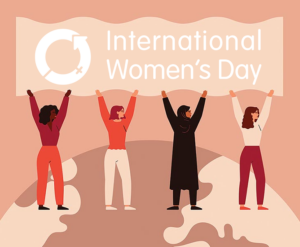
I was born in a generation where it was thought women couldn’t drive cars, write fiction, compose music, compete at sports, or should be let work after marriage. Women were emotional, intuitive, erratic but not really capable of full rationality.
Ireland in the 1950s may have been a few years behind other parts of Europe on these issues, but it has a prior history of women warriors and matriarchy, and may be heading that way again.
Ireland suffered, however, and perhaps will continue to suffer forever from mothers adoring their sons. This gave rise to a joke, perhaps not uniquely Irish, that Jesus was Irish – he was 33 and single and his mother thought he was God.
Women often complain about being ignored at board meetings when they raise good ideas and then find some man repeats them a short while later and is praised for his scintillating insights. The patriarchy often gets blamed, but this happens in families the whole time. Many a younger sister has heard a brother get praised by their mother for something she had mentioned earlier.
Things are changing. Women are winning Nobel Prizes in all domains. They increasingly compose the best music and the previously ignored compositions of women now dead are being resurrected and recognized for the genius they embody. There are fewer and fewer areas where women don’t outdo men.
Many years ago, interview processes in medicine and most other places became standardized. Every interviewer had to ask the exact same question of every candidate. I decided to ask all candidates to tell me about a mistake they had made and what they had learnt from it.
In interview after interview, the women could answer immediately and coherently. Not a single man that I can remember answered immediately or coherently if they did answer.
Objectivity and Science
In a recent lecture I gave in Boston, The History of a Medical Psychosis, I offered a different view of science and objectivity to the standard one. The talk stresses that objectivity does not come from algorithms, logic, numbers, statistics, or any of the other usual suspects but from the engagement of people who know they are fallible, who attempt to come to a consensus view about what they see happening in front of them – in life, in law, and in experiments.
To do science, you have to be prepared to accept that your initial view is wrong, prepared to listen to the insights of others, not deferring to a King or other dominant man over the views of a healthcare assistant or scullery maid, in addition to being able to think outside the box.
Someone with wonderful ‘ideas’ is not engaging with the world. Bumping into things and finding out your ideas are wrong is the engagement we call science and it cannot happen without at least two people attempting to come to a consensus with an openness to the fact they may be wrong and a willingness to change if developments upset a neat idea.
There is no better place to see this happening, or increasingly failing to happen in the modern world, than in the domain of drug induced injury.
Doctors with people in front of them telling them exactly what is going wrong, far more often than before find it impossible to come to a consensus view. They know best. They have used this drug in lots of people, in double or triple the dose, and nothing has gone wrong – come back and talk to me when you have a medical degree.
But these things going wrong, these mistakes, things a doctor has never seen before, are the essence of science. Science is about individuals – not non-existent average people. This medical not-listening has left 15% of the population of many Western countries unable to get off antidepressants – many of them women put on them for menopausal hot flashes. This is a disaster. How blind can a doctor be? Completely, it seems.
When it comes to science, communities of individuals count. In terms of drug problems, the science is now being done by communities of harmed individuals not by individuals in a lab or even a clinic. Its people grappling with conditions like PSSD, who are doing the science, or Annemarie featured in Did My Doctor Make me a Substance Abuser, or my patient with OCD who was cured with nicotine – who is outlined in The History of a Medical Psychosis.
Grappling with the harms being done to people is a sacred mission, on a par with efforts to explore the origins of our universe with the James Webb telescope. Sacred because drug induced injuries are the Stone the Builders rejected.
The History of a Medical Psychosis gives you the plot of Shipwreck of the Singular. The talk ends on a Relationship Based Medicine note. Shipwreck goes a little further and suggests the job worth prioritizing and paying people handsomely for is people-making – at which women are better than men.

Many women would dismiss this and say men can be just as good parents. Many of the same women would say they rule the world by ruling/manipulating men. Manipulation doesn’t sound great. Translate it, though, into nudging young people and men through a Zone of Proximal Development and it becomes the essence of science.
In The Zone
The History of a Medical Psychosis has a message that what all of us want most is to control our own lives. After listening in, Tim Carey in Perth sent me some of his articles on these issues – see Health is Control.
Tim also introduced me to the work of Harvey Max Cochinov who has refashioned the Golden Rule:
Do unto others as you would want to be done to yourself
Into a Platinum Rule
Do unto others as they would want done unto themselves
Its worth reading everything of Harvey’s that you can get hold of – see Ellen and the Platinum Rule.
This message is on the scientific, and clinical money and is exactly what doctors now seem unable to do.
Whose Erratic Now?
Aditi Bhargava who has featured in this blog – see Boosters and Boosterism – was quoted in an New York Times article on Tuesday – Guess Which Sex Behaves More Erratically – in anticipation I guess of International Women’s Day. She was being asked to comment on a study showing that Male Mice were much more erratic in laboratory experiments on behaviour than Female Mice. Until recently only males were used as it was thought that the estrous cycle of the females made them more erratic.
The article, not Aditi, more generally said the same applied to women in medical studies, including pharmacology studies and that this was a problem as women seem more likely to suffer from the adverse effects of drugs than men. The picture for drug trials has been changing over the last 30 years with new regulations requiring sexual parity and ensuring diverse representation (not just Pink People).
This is where the Sacred comes up against the very Profane. There are many good arguments for involving women in clinical trials but little appreciation among those who made the regulations, how what some would call fraud is close to the standard operational model for company trials – see:
This is leading to a crunch point, which is in the name of diversity and equity pregnant women are being recruited to trials. This doesn’t need to happen to find out what the likely effects of a drug taken in pregnancy are.
RSV Vaccine trials are a venue where the issues have become particularly salient lately. The Canadian consent form for the Pfizer RSV Vaccine trial states:
The risks associated with the study vaccine (RSVpreF or placebo) may be experienced by you, but not your baby, since your baby will not receive the study vaccine or placebo directly.
And
All adverse effects that are known at this time about the study vaccine are described in this form.
This really makes no sense at all, particularly as there were risks found to the baby in an earlier GSK trial of a very similar vaccine – increased rates of prematurity and neonatal deaths – as well as increased neonatal jaundice found in an earlier Pfizer trial. These are not mentioned in the consent form.
Women are now being recruited by pharma to scaremonger about RSV and promote the benefits of vaccines. No doctors or patients have seen the data from these trials but investors in the companies have been briefed about the hazards, while at the same time being told the companies know how to get these vaccines into millions of arms. Your baby might not be safe with us but your money is.

Cometh the Moment, Cometh the Women – hopefully.
This post was late for International Women’s Day. Aditi’s mention in the NYT drew my attention to what was going on as well as work by Peter Selley on RSV vaccines. Pfizer and other companies need to be made aware of an emerging New World Order.


for those unable to access the NYT article
Guess Which Sex Behaves More Erratically (at Least in Mice)
By Azeen Ghorayshi March 7, 2023
For decades, male mice have been the default in scientific experiments that test new drugs or examine the connections of the brain. The reason? Female mice, which experience a four- to five-day cycle of fluctuating ovarian hormones, were thought to be too complicated.
Accounting for the hormonal changes was viewed as too cumbersome and too expensive.
But the estrous cycle has little to do with how female mice behave, according to a new study that used machine-learning software to track the second-to-second behavior of animals exploring an open space. Male mice actually exhibited more erratic behavior than females did.
The study, published in the journal Current Biology on Tuesday, challenges century-old stereotypes that kept female animals out of laboratory research — and, until the 1990s, barred women from clinical trials.
The new research is “tipping all of these assumptions about sex differences and the influence of hormones on their head,” said Rebecca Shansky, a behavioral neuroscientist at Northeastern University and a co-author of the new study.
The cost of excluding females — whether human or animal — from scientific research is high. Women are almost twice as likely as men to experience severe side effects from drugs, most of which have dosages brd on the initial testing done in men. Women also may not derive the same benefits from the drugs.
Women “capable of becoming pregnant,” as the federal government put it, were largely excluded from clinical trials of drugs until 1993, when a new law required researchers funded by the National Institutes of Health to include women and minority groups. In the decades since, women have made up close to half of clinical research participants, though they still lag behind in studies of certain drugs, like those used to treat cardiovascular disease and psychiatric disorders.
But a large sex gap persisted in basic science research using lab animals, studies that pave the way to medical breakthroughs. In neuroscience, according to a review published in 2010, studies of male lab animals outnumbered female ones by a factor of five.
“That disconnect between what was in the lab and what was in the clinic was of concern,” said Dr. Janine Clayton, director of the Office of Research on Women’s Health at the N.I.H. “Lots of studies were only employing male mice, with no scientific justification.”
The $33 billion funding agency aimed to close the gap in 2016 by requiring any lab that received grant funding to consider biological sex in their research. With few exceptions, researchers were required to use both males and females in studies of vertebrates and to analyze the data by sex.
That policy change led to an “uproar” among some scientists, Dr. Shansky said. “People were under the assumption that using females would make their data messy,” she said.
Although previous studies have challenged the idea that female mice are more erratic than males, the behavioral tests used were sometimes crude and gave mixed results.
The new study used a cutting-edge tool called motion sequencing, which was developed in 2015. Sophisticated cameras mapped out the animals’ movements in three dimensions, recording 30 frames per second. Then artificial intelligence identified brief — typically 300 milliseconds long — repeated behaviors, like running and grooming.
The cameras rolled as 16 male and 16 female mice explored an open space — a large bucket — for 20 minutes at a time over 15 days. The estrous cycle of the females showed a very weak effect on their behavior, the researchers found.
“You have to really kind of squeeze the data in order to see any effect of estrous,” said Dr. Sandeep Robert Datta, a neurobiologist at Harvard Medical School who is a co-author of the study and whose lab developed the motion-sequencing tool. “From a practical perspective, it’s negligible.”
Male mice exhibited more unpredictable behavior than females did. Hormones in males also fluctuate, typically changing over the course of a day. And male mice that are housed together establish a dominance hierarchy, with alpha males expressing more than 10 times as much testosterone as the submissive ones.
“So it could be that actually, for 100 years, we’ve had it exactly backwards — it’s really variation in male hormones that’s affecting behavior more greatly than female hormones,” Dr. Datta said. “That’s a hypothesis, but it’s one we’re going to test.”
The new report is the latest of several studies to make scientists question longstanding assumptions about the impacts of hormones in female lab animals.
“The fact that they did not find an effect of estrous cycle, and other researchers haven’t seen that effect either, it’s very reassuring,” said Dr. Aditi Bhargava, who studies sex differences and the biology of stress at the University of California, San Francisco.
Nevertheless, she noted, the impacts of the N.I.H.’s 2016 policy change have been slow. Although the proportion of studies that include both male and female animals has increased, the number of studies that analyze the data by sex has gone down, except in pharmacology.
“More work needs to be done,” said Dr. Clayton of the N.I.H. “It is in the best interest of the public that sex-specific results are published.”
Brook Jackson
@IamBrookJackson
I know more than 10 clinical trial participants/families willing to discuss their experiences w/@GSK & @pfizer RSV shot. Maternal/fetal deaths, tethered spinal cords in infants, GBS, oligohydramnios; so awful & tragic. 5 more reasons
@FDACBER @OIGatHHS should inspect Ventavia!
• The new RSV vaccines showed a SAFETY problem so Alarming, GlaxoSmithKline had to Abruptly End all clinical trials.
https://twitter.com/IamBrookJackson/status/1629345466746806272
“GRACE,” …
GSK halts three trials of respiratory virus vaccine in pregnant women
https://www.reuters.com/business/healthcare-pharmaceuticals/gsk-halts-trial-respiratory-virus-vaccine-pregnant-women-2022-02-28/
Feb 18 (Reuters) – GSK (GSK.L) has paused a late-stage trial of its vaccine candidate against the respiratory syncytial virus (RSV) in pregnant women based on safety recommendations from an independent committee, the British drugmaker said on Friday.
The world’s biggest vaccine maker by sales did not give further details on why it paused the trial, dubbed “GRACE,” as well as two other studies, but said a trial of its experimental RSV vaccine for adults aged 60 and over would continue…
‘This is leading to a crunch point, …
Albert Bourla
@AlbertBourla
·
Feb 21
Great progress on our RSV vaccine candidate programs:
@US_FDA has accepted our application for maternal immunization for Priority Review, and @EMA_News has accepted our applications for older adults and maternal immunization for accelerated assessment.
https://on.pfizer.com/3XPGkzZ
Better Patient Care Calls for a ‘Platinum Rule’ to Replace the Golden One
A new principle in medicine focuses on understanding patients’ values, not assuming they share your own
https://www.scientificamerican.com/article/better-patient-care-calls-for-a-platinum-rule-to-replace-the-golden-one/
In cases where patients cannot speak for themselves and where loved ones are uncertain of their wishes, clinicians may find it hard to apply the platinum rule. But, as Frazee sees it, there is value in the effort: “At the very least, your attempt to work through it will ensure that you have sufficient humility about the wisdom of your choices.”
https://twitter.com/HMChochinov
It looks like GSK, Pfizer have met their match,; and with Aditi Bhargava and Harvey Max Chochinov …
My book-in-progress contains in-depth interviews with both Dr. Bhargava and Brook Jackson. Watch this space.
The Golden Rule
Do unto others as you would want to be done to yourself.
Would any sane pregnant doctor or pharmaceutical scientist participate in a trial of having an untested foreign protein injected into their body?
I think generally speaking it is a good idea to avoid sweeping generalizations. Because so much of a persons emotional make up is based on nurturing, education, and experience. Temperament also seems related genetic factors, cultural values. In my own experience women seem better at taking direction from those in charge, but then again some men excel in this as well. I will say that women are encouraged to see themselves as part of a class, while to do this with men might raise a cry of sexism. Its ok to see women in terms of social history, rather than men. Men on the other hand have historically had the most casualties in war. This is also a kind of oppression. The short answer is some women are better, some are not. The same applies to men.